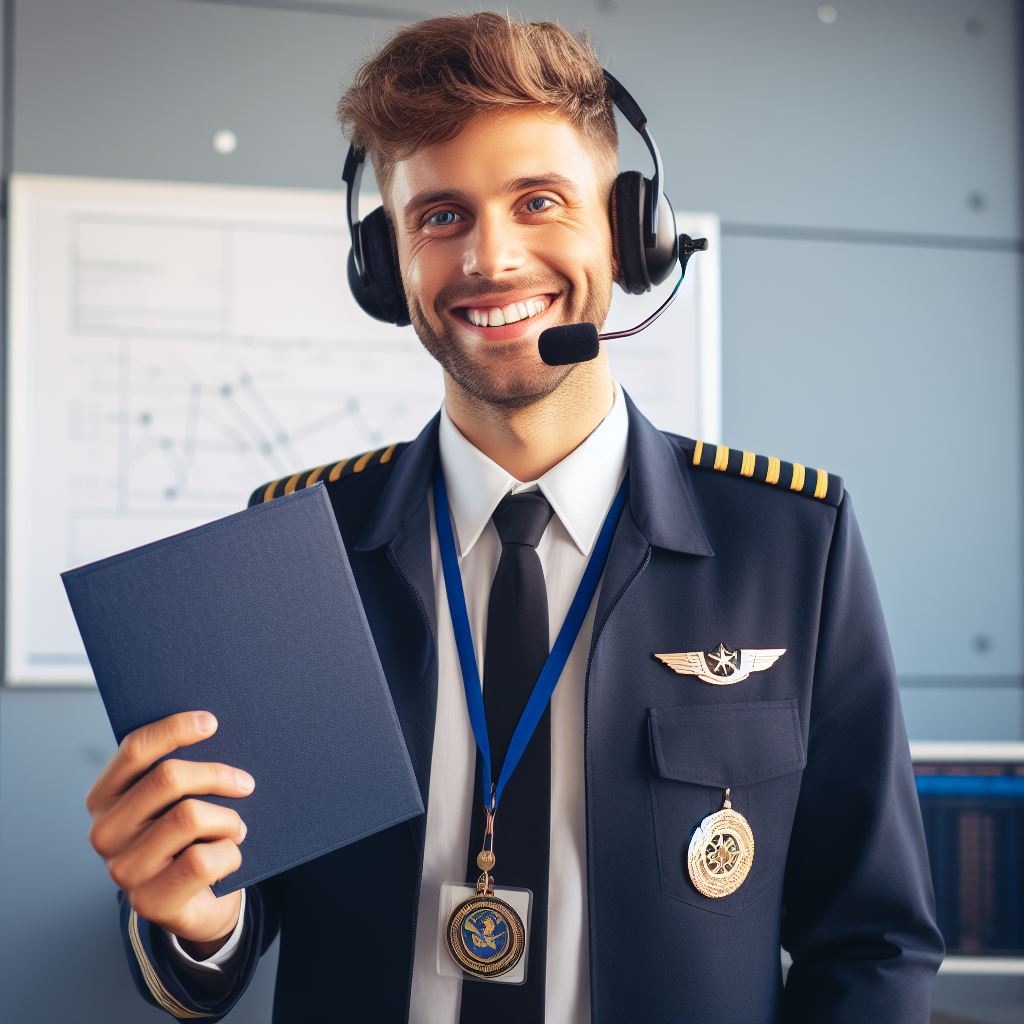Introduction
Stress and fatigue are common issues in the cockpit, affecting pilot performance and safety.
In the cockpit, stress and fatigue pose serious risks, impacting decision-making and reaction time.
High-pressure situations demand resilient coping mechanisms.
Continuous monitoring and addressing pilot fatigue are imperative for maintaining aviation safety and preventing critical errors.
Sleep-deprivation and long-duty hours intensify these challenges, emphasizing the need for vigilant management strategies.
Integrated solutions, such as improved scheduling and crew rotation, are vital for minimizing the detrimental effects of stress and fatigue.
Aviation authorities and airlines play pivotal roles in establishing and enforcing effective regulations to safeguard pilots and passengers.
Proactive measures, including training on stress management, further enhance pilot preparedness, ensuring a safer and more resilient aviation environment.
Prioritizing mental well-being is paramount to sustaining optimal performance and safety in the high-stakes aviation industry.
Effective management of stress and fatigue is vital for ensuring pilots’ safety during flights.
Pilots face stress and fatigue in the cockpit, impacting decision-making and performance.
High-pressure situations demand effective coping strategies for safety.
Adequate rest is imperative for mitigating fatigue-related risks during flight operations.
This blog chapter will provide valuable tips and advice on how to manage stress and fatigue in the cockpit.
Understand the Causes and Effects of Stress and Fatigue
Common stressors in the cockpit
- High workload and time pressure can lead to increased stress levels.
- Unexpected situations such as mechanical failures or adverse weather conditions can cause stress.
- Communication issues or conflicts with other crew members can contribute to stress.
- Responsibility for the safety of passengers and the aircraft can create significant stress.
Impact of stress on pilot performance and decision-making
- Stress can impair cognitive abilities, affecting attention, memory, and problem-solving skills.
- Increased stress levels can lead to decreased situational awareness and decision-making abilities.
- Anxiety and stress can reduce a pilot’s ability to effectively communicate with air traffic control.
- Stress can cause physical symptoms like muscle tension, headaches, or stomach discomfort, further impacting performance.
How fatigue can impair cognitive abilities and physical coordination
- Fatigue affects a pilot’s alertness, reaction time, and judgment, leading to slower cognitive processing.
- Diminished focus and attention due to fatigue can result in missed or delayed responses to critical situations.
- Physical coordination and motor skills can be impaired by fatigue, affecting precise aircraft control.
- Fatigue can decrease the ability to effectively monitor and respond to ongoing flight conditions.
Overall, understanding the causes and effects of stress and fatigue is crucial for managing them in the cockpit.
Identifying common stressors, such as high workload or communication issues, helps pilots proactively address and minimize their impact.
Recognizing the ramifications of stress on performance and decision-making emphasizes the importance of stress management techniques, such as relaxation exercises or mindfulness.
Similarly, acknowledging how fatigue impairs cognitive abilities and physical coordination highlights the necessity of proper rest periods and scheduling practices in aviation.
By actively addressing stress and fatigue, pilots can enhance their overall well-being and ensure safe and efficient operations in the cockpit.
Read: The Demand for Pilots in the US: Current Trends
Transform Your Career Today
Unlock a personalized career strategy that drives real results. Get tailored advice and a roadmap designed just for you.
Start NowRecognize the Signs of Stress and Fatigue
Physical and emotional symptoms of stress
- Rapid heartbeat and shallow breathing.
- Feeling anxious, irritable, or overwhelmed.
- Headaches, muscle tension, and fatigue.
- Trouble sleeping or changes in appetite.
- Difficulty concentrating or making decisions.
Behavioral signs of fatigue
- Excessive yawning or feeling drowsy.
- Decreased motivation and productivity.
- Forgetfulness and difficulty in following instructions.
- Impaired judgment and increased risk-taking behavior.
- Blurred vision, slowed reaction time, and poor coordination.
Importance of self-awareness and early recognition of these signs
- Recognizing and acknowledging stress and fatigue can prevent errors and accidents.
- Early detection enables pilots to implement strategies to manage stress and avoid burnout.
- Monitoring one’s physical and emotional state allows for effective decision-making in-flight.
- Seeking support and utilizing coping mechanisms are essential for maintaining mental well-being.
- By addressing signs promptly, pilots can ensure their own safety and that of their passengers.
Read: Common Misconceptions About Pilots Debunked!
Effective Stress Management Techniques
In the fast-paced world of aviation, managing stress and fatigue is crucial for pilots and crew members.
Effective stress management techniques can improve mental well-being and overall performance in the cockpit.
Importance of relaxation and stress reduction techniques
Stress can take a toll on both mental and physical health.
Therefore, implementing relaxation techniques is vital for reducing stress levels and promoting a calmer state of mind.
- Deep breathing exercises: Taking slow, deep breaths can help activate the body’s relaxation response and reduce stress. It is a simple and effective technique that can be practiced anywhere.
- Meditation and mindfulness practices: Engaging in meditation or mindfulness exercises can improve focus, reduce anxiety, and foster a greater sense of inner peace.
- Physical activities to relieve tension:‘Regular exercise, such as yoga or jogging, can release endorphins, which are natural stress-fighting hormones. It also helps in reducing muscle tension and promoting relaxation.
Tips for maintaining a healthy work-life balance
Maintaining a healthy work-life balance is essential for pilots to prevent burnout and maintain a sense of well-being outside of their flying duties.
- Setting boundaries and managing time effectively:‘It is essential to set clear boundaries between work and personal life. Prioritizing tasks, delegating when necessary, and optimizing time management are crucial skills to maintain a healthy balance.
- Pursuing hobbies and activities outside of aviation:‘Engaging in hobbies, such as playing a musical instrument or painting, can provide a much-needed break from work-related stress and enhance overall satisfaction and happiness.
- Building a support network:‘Having a strong support system consisting of family, friends, and colleagues can facilitate effective stress management. Sharing experiences, seeking advice, and receiving emotional support can alleviate stress and foster a sense of belonging.
In essence, implementing effective stress management techniques and maintaining a healthy work-life balance are essential for individuals in the aviation industry.
By prioritizing relaxation techniques and setting boundaries, individuals can minimize stress, improve overall well-being, and enhance performance in the cockpit.
Read: Exploring Different Flying Careers: Beyond Airlines

Learn More: How to Become a Train Conductor: Step-by-Step Guide
Strategies for Combating Fatigue
Fatigue is a significant concern for pilots as it can impair performance and decision-making abilities, which can jeopardize the safety of flights.
Therefore, implementing effective strategies to combat fatigue is essential for managing stress and ensuring a high level of performance in the cockpit.
Importance of adequate rest and sleep
Adequate rest and sleep play a crucial role in combating fatigue.
Establishing a consistent sleep schedule allows the body to regulate its internal clock, promoting better sleep quality and overall well-being.
By going to bed and waking up at the same time each day, pilots can align their sleep patterns with their circadian rhythms, optimizing their rest periods.
Tips for improving sleep quality
In addition to maintaining a consistent sleep schedule, creating a conducive sleep environment is vital.
Pilots should ensure that their sleeping quarters are comfortable, quiet, and dark.
Using earplugs or eye masks can help eliminate external disturbances and improve sleep quality.
It is also advisable to disconnect from electronic devices before bedtime as the blue light emitted by screens can interfere with the body’s natural sleep-wake cycle.
Showcase Your Business Today
Reach thousands of readers actively exploring professional services. Publish your business profile and grow your audience now.
Publish NowTo further enhance sleep quality, it is recommended to avoid stimulants close to bedtime.
Caffeine, nicotine, and alcohol can disrupt sleep patterns and prevent deep, restorative sleep.
Instead, pilots should choose decaffeinated beverages and engage in relaxing activities, such as reading or listening to calming music, before bed.
Implementing a wind-down routine signals the body that it is time to unwind and prepares it for a restful sleep.
Napping strategies to combat fatigue
Napping can be a beneficial strategy for combating fatigue, especially during long flights or when experiencing sleep disturbances.
However, it is essential to nap strategically to avoid grogginess and disruption of nighttime sleep.
Power naps, lasting around 20 minutes, can provide a quick energy boost and improve alertness.
These short naps prevent entering deep sleep, which can lead to sleep inertia.
Understanding the optimal duration and timing of naps based on personal sleep needs and circadian rhythms is crucial for achieving the desired benefits.
Generally, managing stress and fatigue in the cockpit requires the implementation of effective strategies.
Emphasizing the importance of adequate rest and sleep, establishing consistent sleep schedules, and creating a conducive sleep environment are essential steps in combating fatigue.
Additionally, adopting tips for improving sleep quality, such as avoiding stimulants and implementing wind-down routines, can further enhance restfulness.
Finally, understanding napping strategies, including optimal duration and timing, allows pilots to combat fatigue and maintain optimal performance during flights.
Read: Challenges and Rewards of Being a Female Pilot in the US
See Related Content: Diversity in the U.S. Logistics Profession: A Closer Look
Coping with Stress and Fatigue During Long Flights
Stress and fatigue can significantly impact pilots’ performance during long flights.
However, by implementing effective strategies both before and during the flight, it is possible to manage stress levels and stay alert throughout the journey.
Implementing pre-flight preparations for stress and fatigue management
Implementing pre-flight preparations for stress and fatigue management
- Getting enough rest prior to a long flight is crucial to ensure pilots begin the journey well-rested and with optimal energy levels. This can be achieved by following a proper sleep routine and avoiding activities that may disrupt quality sleep.
- Maintaining proper hydration and nutrition is essential in combating fatigue during long flights. Pilots should drink enough water throughout the day to stay hydrated. Additionally, consuming balanced meals with a combination of carbohydrates, proteins, and healthy fats will provide sustained energy levels.
- Psychological readiness plays a significant role in managing stress. Pilots should engage in mental preparation techniques such as visualization, positive self-talk, and relaxation exercises. These practices help in reducing anxiety and promoting a calm state of mind before the flight.
In-flight strategies to combat stress and stay alert
- Engaging in regular physical movement is vital during long flights. Pilots should perform stretching exercises and walk around the cockpit to prevent muscle stiffness and promote blood circulation. These movements also help in reducing the risk of deep vein thrombosis.
- Mental stimulation is another effective strategy to combat stress and prevent fatigue. Pilots can engage in activities such as solving puzzles, reading, or listening to stimulating podcasts. These activities keep the mind engaged and prevent monotony, enhancing alertness.
- Collaborative decision-making with co-pilots or crew members can significantly reduce stress levels. Sharing the workload and actively involving others in the decision-making processes helps in preventing burnout and promotes a supportive and efficient working environment.
By implementing these coping strategies, pilots can effectively manage stress and fatigue during long flights, ensuring their performance remains at an optimal level.
It is crucial to prioritize self-care and utilize available resources to maintain a healthy mind and body in the cockpit.
You Might Also Like: Supply Chain Analyst vs. Data Analyst: Differences
Conclusion
Recap of the discussed tips and advice for managing stress and fatigue in the cockpit
- Recognize and respond to stress and fatigue signals
- Practice proper sleep habits and take naps when necessary
- Adopt healthy lifestyle choices including exercise and balanced diet
- Utilize relaxation techniques and engage in hobbies or activities outside of work
- Seek support from peers, mentors, and professionals
Reinforcement of the importance of prioritizing pilots’ well-being for safe operations
Prioritizing pilot well-being is paramount for ensuring safe and efficient flight operations.
A rested and healthy pilot contributes directly to enhanced situational awareness, decision-making, and overall performance.
Airlines must actively address factors such as fatigue, stress, and mental health to mitigate potential risks and ensure a secure aviation environment.
Implementing comprehensive wellness programs, regular health check-ups, and promoting a supportive work culture contribute to sustained pilot well-being.
Monitoring and addressing psychological factors alongside physical health is essential for sustained safety and operational success.
Recognizing and alleviating stressors, both in and out of the cockpit, fosters a resilient and focused pilot workforce.
By prioritizing the mental and physical health of pilots, the aviation industry can strengthen its commitment to safety, promoting a culture where well-being is integral to operational excellence.
Acknowledging and addressing the holistic needs of pilots is fundamental for maintaining the highest standards of safety and reliability in aviation.
Encouragement to implement these strategies and seek further resources and support when needed
Implement strategies for success and seek support as needed.
Proactive steps empower individuals to overcome challenges, fostering growth and resilience.
Engaging additional resources amplifies effectiveness and ensures sustained progress.
Encouragement to utilize available tools and networks, creating a robust foundation for personal and professional development.
Taking initiative in seeking support fortifies one’s journey, leading to enhanced skills and increased chances of success.
Embrace a proactive mindset, recognizing that seeking assistance is a strength, not a weakness.
Utilize available resources to maximize potential and foster a culture of continuous improvement and achievement.
[E-Books for Sale]
The Big Book of 500 High-Paying Jobs in America: Unlock Your Earning Potential
$19.99 • 500 High-Paying Jobs • 330 pages
Explore 500 high-paying jobs in America and learn how to boost your career, earn more, and achieve success!
See All 500 High-Paying Jobs of this E-Book
1001 Professions Without a Degree: High-Paying American Jobs You Can Start Now
$19.99 • 1001 Professions Without a Degree • 174 pages
Discover 1001 high-paying jobs without a degree! Unlock career tips, skills, and success strategies for just $19.99!




